Moving to QuickBooks Online From Various Accounting Software
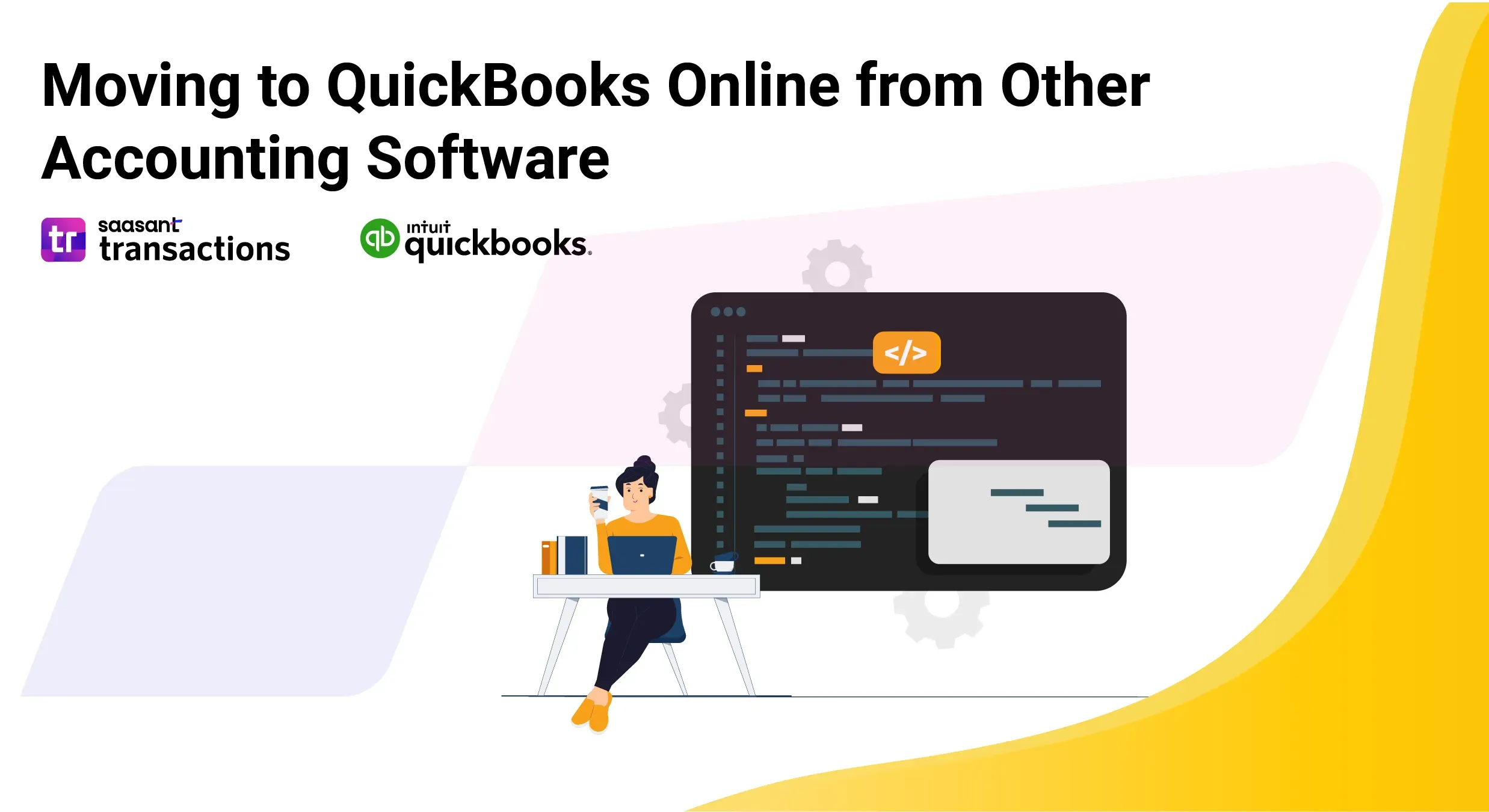 The world of business finance is experiencing a digital revolution. On-premise accounting software, once the industry standard, rapidly gives way to cloud-based solutions like QuickBooks Online. This shift is driven by a compelling value proposition: increased accessibility, scalability, and collaboration.
The world of business finance is experiencing a digital revolution. On-premise accounting software, once the industry standard, rapidly gives way to cloud-based solutions like QuickBooks Online. This shift is driven by a compelling value proposition: increased accessibility, scalability, and collaboration.
Contents
Unlocking the Power of Cloud-Based Accounting
Identifying the Ideal Candidates for Cloud-Based Accounting
Taking the Leap: A Comprehensive Guide to Migrating from QuickBooks Desktop to QuickBooks Online
Level Up Your Finances: A Comprehensive Guide to Migrating from Excel to QuickBooks Online
Stepping Up Your Accounting Game: Migrating from Xero to QuickBooks Online
Mastering Migration: A Deep Dive Into Seamless Platform Transitions
FAQs
Unlocking the Power of Cloud-Based Accounting
The core advantage of cloud-based accounting lies in its inherent flexibility. Unlike on-premise software, which tethers you to a specific computer or server, QuickBooks Online offers unparalleled accessibility. Here's how it elevates your financial management:
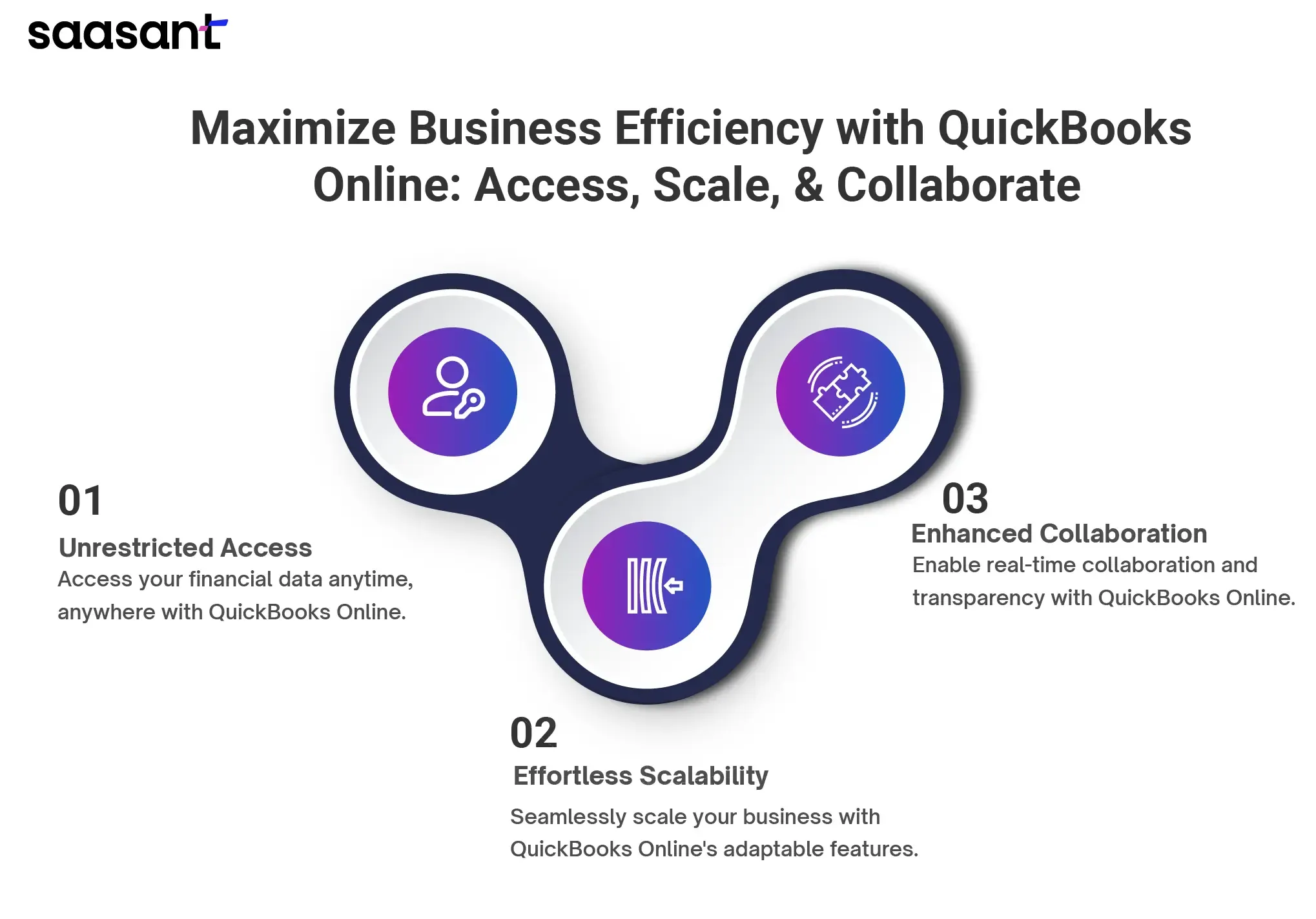
Unrestricted Access: Imagine managing your finances from anywhere, anytime. With QuickBooks Online, secure login allows you to access your financial data from any device with an internet connection. This empowers you to monitor cash flow, generate reports, and approve invoices, fostering greater control over your business finances.
Effortless Scalability: Businesses are dynamic entities, and their accounting needs evolve with them. QuickBooks Online seamlessly adapts to your growth. Gone are the days of expensive software upgrades and IT headaches. Add new features and functionalities as required, ensuring your accounting processes remain efficient and scalable.
Enhanced Collaboration: Streamline communication and financial transparency within your organization. QuickBooks Online facilitates real-time collaboration, allowing you, your team members, and your accountant to access and work on the same accounts simultaneously. This fosters better communication, reduces errors, and streamlines financial workflows.
Identifying the Ideal Candidates for Cloud-Based Accounting
While cloud-based accounting offers numerous advantages, some businesses stand to benefit more than others. Here are a few scenarios where switching to QuickBooks Online can be particularly advantageous:
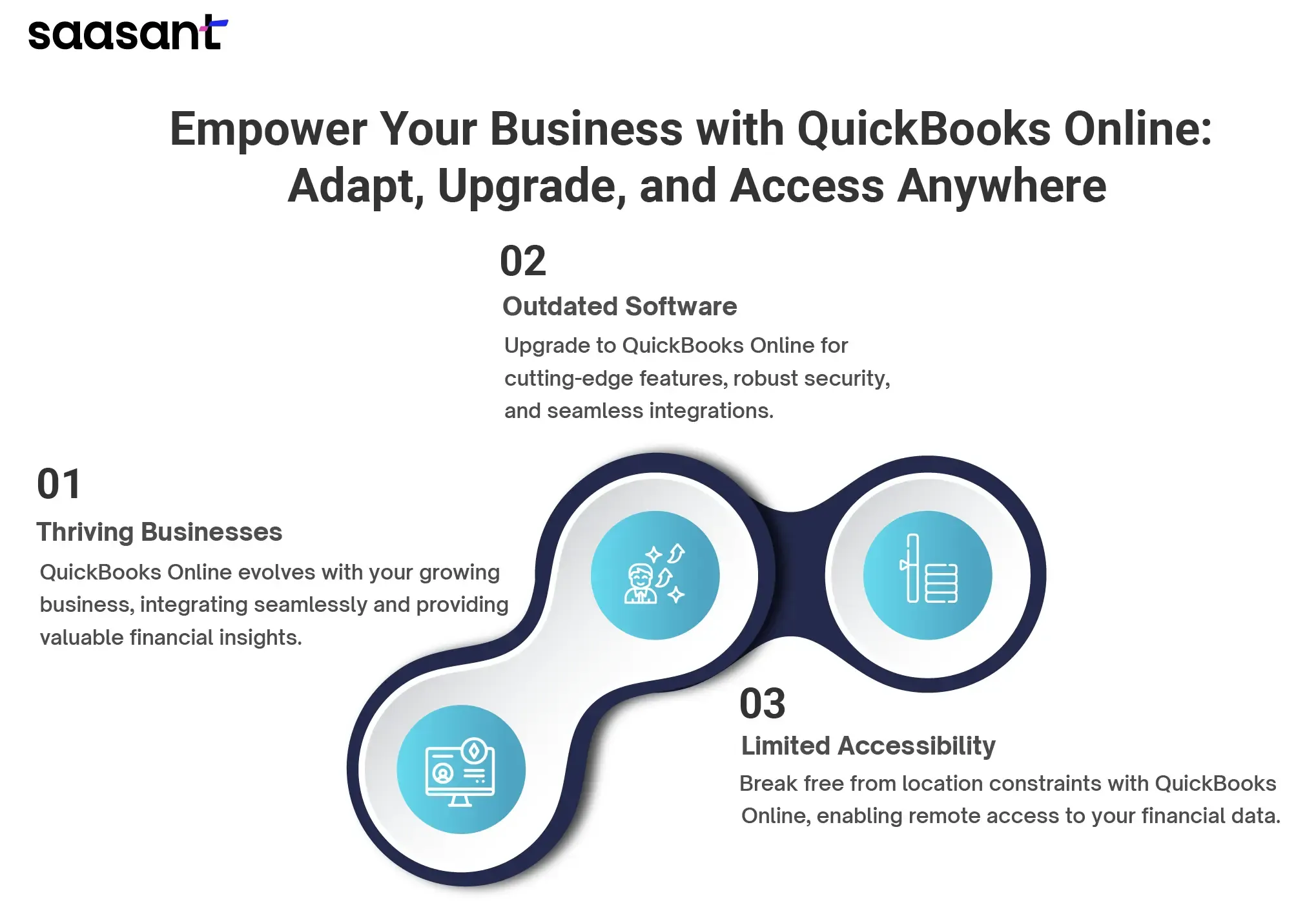
Thriving Businesses: As your business scales, the limitations of on-premise software become increasingly apparent. QuickBooks Online's adaptability ensures your accounting practices can evolve alongside your business. Easily manage complex financials, integrate with third-party applications, and gain valuable insights to fuel further growth.
Outdated Software: Is your current accounting software a relic of the past? Does it lack vital features, security updates, and integrations? If so, it's time for an upgrade. QuickBooks Online offers the latest features, robust security protocols, and seamless integrations with popular business tools. This ensures your financial data remains secure, your processes are efficient, and you can access the latest technological advancements.
Limited Accessibility: On-premise software restricts access to your financial data to a single location. This can be incredibly limiting, especially for geographically dispersed teams or those who require remote access. QuickBooks Online eliminates these limitations. Authorized users can access and manage accounts from anywhere with an internet connection, enhancing overall workflow efficiency.
Beyond Convenience: The Strategic Advantages of Cloud Accounting
The benefits of cloud-based accounting extend far beyond simple accessibility. QuickBooks Online empowers businesses to make data-driven decisions through a range of features:
Automated Data Entry: Streamline your bookkeeping process using bank feeds and automatic expense categorization. This reduces manual data entry errors and saves valuable time, allowing you to focus on strategic financial planning.
Real-Time Reporting: With customizable reports and dashboards, you can gain instant insights into your financial health. Track key metrics like cash flow, profitability, and accounts payable/receivable in real time, enabling you to make informed decisions based on the latest financial data.
Integration with Business Tools: Boost your overall business efficiency by integrating QuickBooks Online with your existing CRM, inventory management, and e-commerce platforms. This eliminates manual data transfer and ensures seamless communication between your financial data and other business-critical applications.
The future of business finance is undoubtedly cloud-based. QuickBooks Online stands at the forefront of this revolution, offering businesses of all sizes a comprehensive and scalable accounting solution. Its accessibility, robust feature set, and collaborative capabilities empower you to manage your finances more efficiently, gain valuable insights, and ultimately, make data-driven decisions that propel your business forward.
Taking the Leap: A Comprehensive Guide to Migrating from QuickBooks Desktop to QuickBooks Online
QuickBooks Desktop has been the cornerstone of many established businesses' financial management for years. However, the tides are turning in the accounting software world. Cloud-based solutions like QuickBooks Online (QBO) are increasingly popular due to their accessibility, scalability, and collaborative features. While migrating from a familiar platform like Desktop to QBO might seem significant, the long-term benefits can be substantial. This section will equip you with the knowledge and resources to navigate this transition seamlessly.
Understanding the Migration Landscape: Challenges and Solutions
A successful migration from QuickBooks Desktop to QBO requires careful planning and preparation. Here's a breakdown of the key challenges you might encounter and the strategies to overcome them:
Data Conversion: Transferring your historical financial data from Desktop to QBO is paramount. Thankfully, Intuit offers built-in migration tools within QuickBooks Desktop. These tools allow you to export your company file (.QBW) and import it directly into QBO. However, it's crucial to understand that not all data elements translate flawlessly. Here's a breakdown of what migrates and what might require additional attention:
Customers, Vendors, and Accounts: These foundational elements typically migrate smoothly.
Open Invoices and Bills: These often transfer successfully, but you might need to recreate any custom fields associated with them.
Inventory Items: Basic inventory data usually migrates well. However, complex inventory functionalities like advanced pricing or multi-location tracking might require manual configuration in QBO.
Historical Transactions: While general transactions often convert, ensure you reconcile your accounts after the migration to verify accuracy.
Reports and Customizations: These won't migrate directly, but QBO offers a robust reporting suite and customization options to recreate them.
User Adoption: Change management is vital for a successful migration. The user interface (UI) of QBO differs from Desktop, potentially causing initial resistance from your team. To ensure smooth user adoption, consider these strategies:
Leverage Intuit's Training Resources: Intuit offers a wealth of online tutorials, webinars, and video guides specifically designed to help users navigate QBO's functionalities. Encourage your team to explore these resources and familiarize themselves with the new platform.
Develop In-House Training Materials: Create custom training materials that cater to your workflows and team needs. These could include cheat sheets, process walkthroughs, or recorded demonstrations.
Personalized Coaching: Consider offering customized coaching sessions for critical users needing additional support transitioning to QBO.
Workflow Adjustments: Moving from desktop-based software to a cloud platform might necessitate adjustments to your existing workflows. Here's how to approach this transition effectively:
Identify Repetitive Tasks: Analyze your current workflows and identify tasks that can be automated with QBO's built-in automation features. This could include automatic bill payments, scheduled invoice generation, or recurring transactions.
Explore Collaboration Tools: QBO facilitates seamless collaboration by allowing multiple users to access and update financial data simultaneously. This can significantly improve communication and streamline workflows within your team.
Embrace Continuous Improvement: After migrating to QBO, don't be afraid to experiment and refine your workflows. Use QBO's functionalities to optimize your financial processes and boost efficiency.
Unlocking the Power of QuickBooks Online
Migrating to QBO offers a multitude of benefits that can transform your financial management approach:
Enhanced Accessibility: QBO is a cloud-based solution that grants you access to your financial data from any device with an internet connection. This eliminates the need for a dedicated workstation, fostering remote work capabilities and increased flexibility for your team.
Automatic Backups and Disaster Recovery: Say goodbye to the worry of manual backups! QBO automatically backs up your data in the cloud, ensuring data security and peace of mind. In the event of a hardware failure or other unforeseen circumstances, your financial information remains safe and readily accessible.
Real-Time Collaboration: QBO promotes seamless collaboration by allowing multiple users to access and update the accounting data simultaneously. This fosters real-time visibility into financial health, improves communication, and streamlines decision-making processes.
Improved Scalability: QBO scales effortlessly with your business needs. As your business grows, you can easily upgrade your QBO subscription to unlock additional features and user seats. This eliminates the need for expensive software upgrades associated with desktop-based solutions.
Integration Potential: QBO integrates seamlessly with a vast ecosystem of third-party applications. These integrations can significantly enhance workflows by connecting QBO with your CRM software, payroll solutions, or e-commerce platforms.
Level Up Your Finances: A Comprehensive Guide to Migrating from Excel to QuickBooks Online
For many small and medium-sized businesses (SMBs), the familiar spreadsheet has been a loyal companion in managing finances. But as your business scales, Excel's limitations become evident. Inaccuracy creeps in due to inconsistent formatting, manual data entry becomes a tedious burden, and generating insightful reports feels like an uphill battle. This is where migrating to QuickBooks Online offers a powerful and user-friendly solution to streamline financial management and unlock valuable business intelligence.
The Pitfalls of Perpetually Using Excel
Data Formatting Quagmire: Maintaining consistent formatting across numerous Excel sheets can be a logistical nightmare. Inconsistent data formats create discrepancies, hindering the accuracy of reports and jeopardizing financial analysis. Imagine the frustration of identifying and correcting errors buried deep within complex spreadsheets!
Manual Entry Meltdown: Manually entering every transaction is time-consuming and error-prone. It eats away at valuable time that could be better spent focusing on strategic growth initiatives. Think about the countless hours you could reclaim by automating repetitive tasks.
Reporting Roadblocks: While familiar, Excel's reporting capabilities are often basic and limited. Generating professional-looking reports that impress stakeholders can be a challenge. Furthermore, extracting actionable insights from mountains of data becomes cumbersome.
Building a Bridge to a Brighter Financial Future: Solutions for a Smooth Migration
Import Tools to the Rescue: QuickBooks Online provides user-friendly import tools designed to seamlessly migrate your existing customer, vendor, and product data from Excel. This eliminates manual data entry and ensures a smooth transition to the new platform.
Chart of Accounts: The Foundation of Financial Organization: It is crucial to set up a clear and well-organized chart of accounts in QuickBooks Online. This acts as a financial taxonomy, accurately categorizing your income and expenses. A well-structured chart of accounts empowers you to generate insightful reports and better understand your business performance.
Effortless Bank Integration for Hands-Free Finance: Connecting your bank accounts to QuickBooks Online automates transaction downloads. This eliminates the need for manual data entry, reduces the risk of errors, and saves you countless hours. Imagine the peace of mind knowing your financial data is automatically updated and reconciled!
Reaping the Rewards of a Modernized Financial System
Enhanced Accuracy, Empowered Decisions: Streamlined data entry and automated processes minimize errors, leading to more reliable financial data. You can finally make confident business decisions based on accurate and up-to-date information.
Time Saved, Growth Achieved: Say goodbye to tedious manual tasks like data entry and reconciliation. QuickBooks Online frees up valuable time to focus on core business activities like marketing, sales, and product development. Invest your saved time in propelling your business forward!
Professional Financial Reporting Made Easy: Generate professional-looking reports that impress investors, lenders, and stakeholders. QuickBooks Online offers an array of customizable reports that provide a comprehensive view of your financial health. Gain deeper insights into your profitability, cash flow, and key performance indicators (KPIs).
Global Appeal: QuickBooks Online caters to businesses worldwide, offering features and functionalities tailored to diverse tax and regulatory environments. No matter your location, QuickBooks Online can be a valuable asset in managing your finances.
Beyond the Basics: This section provides a foundational understanding of migrating from Excel to QuickBooks Online. However, QuickBooks Online offers many advanced features to streamline specific financial management aspects. Explore features like inventory management, invoicing, bill pay, and budgeting to optimize your financial processes further.
The Final Word: Migrating from Excel to QuickBooks Online empowers your business with a robust and automated financial management system. Embrace the benefits of improved accuracy, time savings, and professional reporting. Take control of your finances, unlock valuable insights, and propel your business towards achieving its full potential.
Stepping Up Your Accounting Game: Migrating from Xero to QuickBooks Online
Many businesses, especially those experiencing growth, reach a point where their accounting software needs an upgrade. Xero and QuickBooks Online are two popular cloud-based solutions, but for some, QuickBooks Online might offer a more robust feature set and a broader ecosystem of integrations. Here, we'll explore the challenges and benefits of transitioning from Xero to QuickBooks Online, equipping you to make an informed decision for your business.
Challenges on the Road to Migration
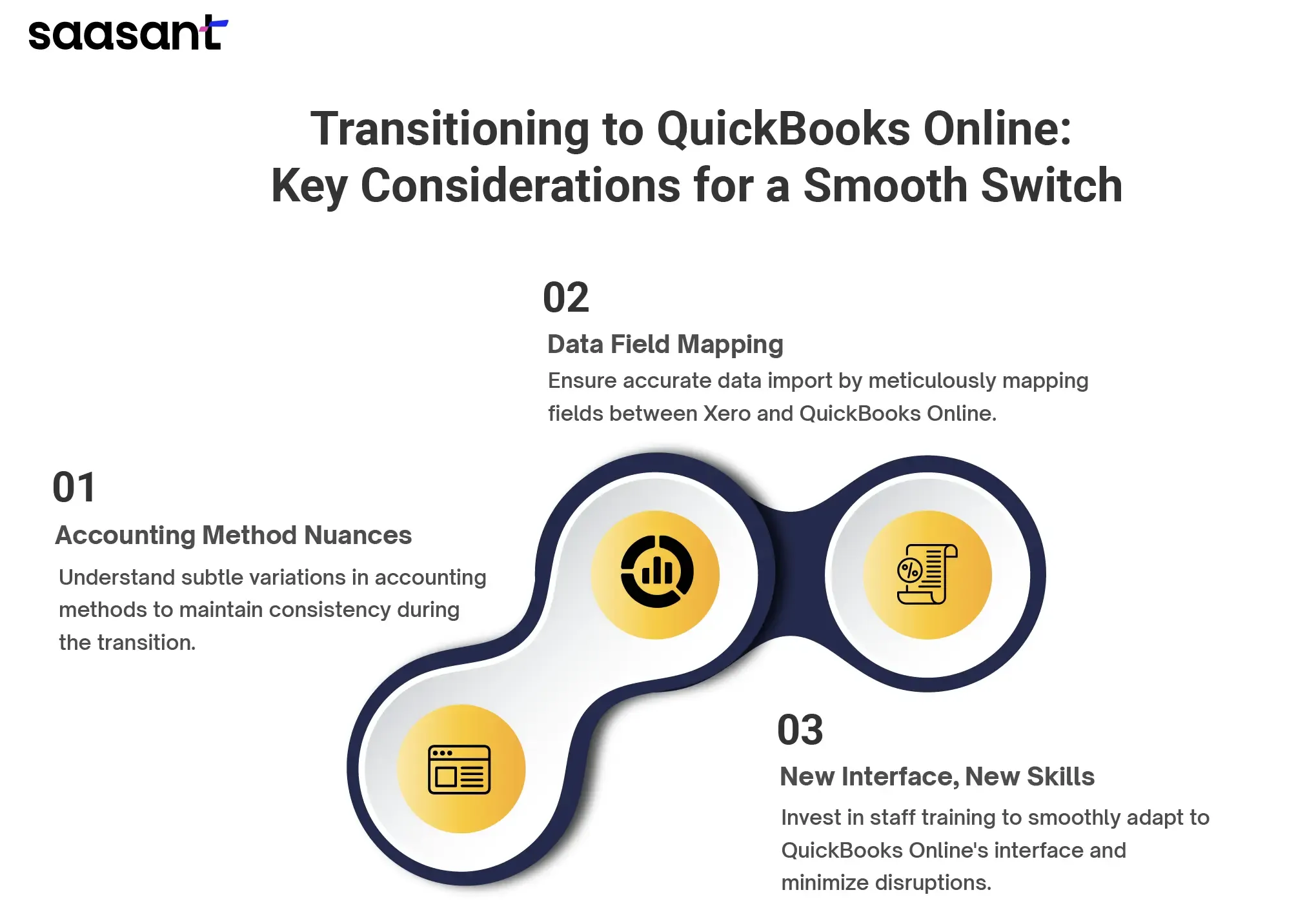
Accounting Method Nuances: While both platforms offer popular accounting methods like cash and accrual, subtle variations might exist. Understanding these nuances is crucial to avoid inconsistencies during the transition.
Data Field Mapping: Reconciling data fields between Xero and QuickBooks Online can be tricky. Account names and structures might differ, requiring meticulous mapping to ensure accurate data import.
New Interface, New Skills: Adapting to QuickBooks Online's interface will require time and training. Investing in staff training can ensure a smooth learning curve and minimize disruptions.
Solutions that Streamline the Process
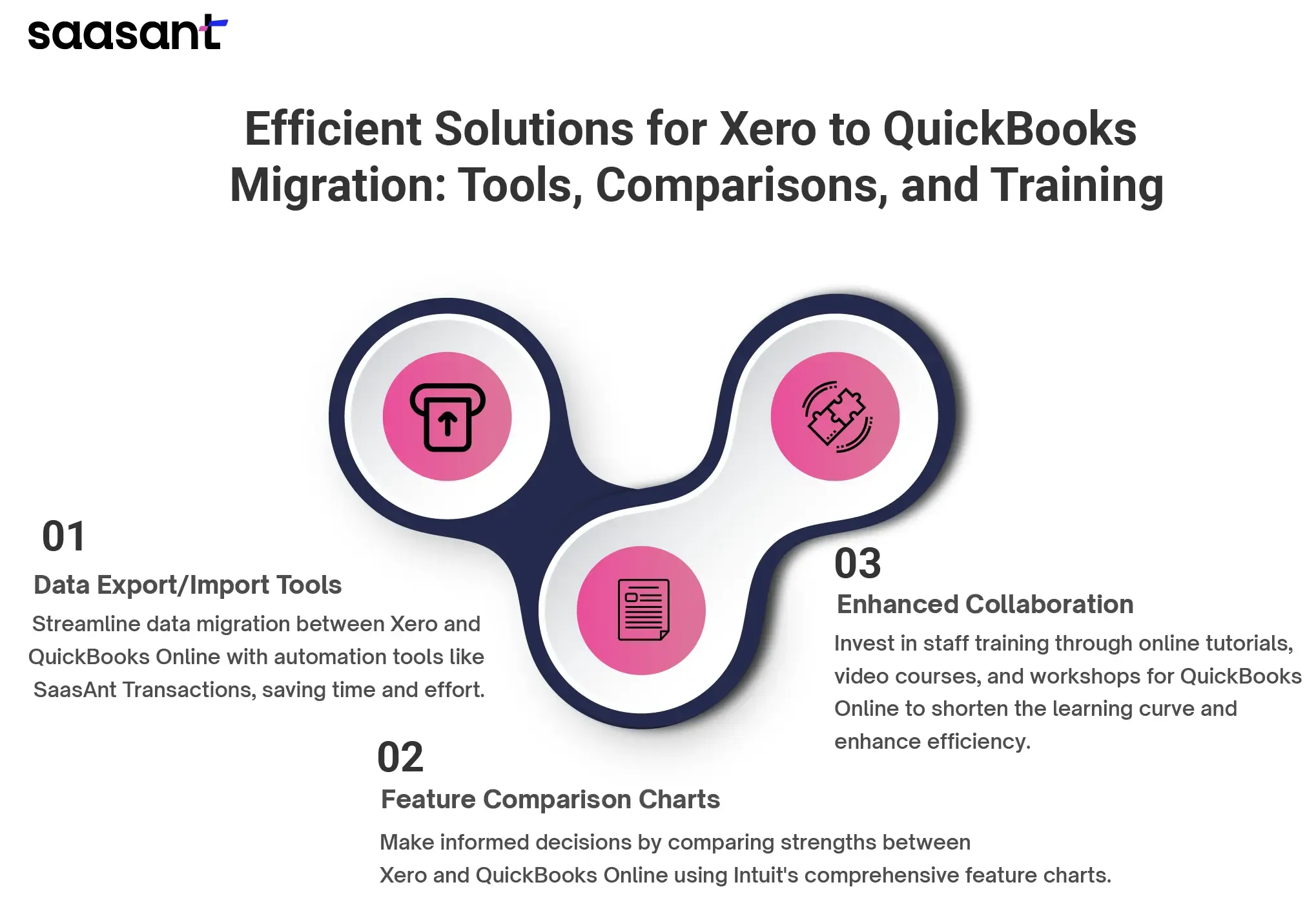
Data Export/Import Tools: Thankfully, several external applications like SaasAnt Transactions facilitate data migration between Xero and QuickBooks Online. These applications can automate data mapping, saving you significant time and effort.
Feature Comparison Charts: Intuit, the maker of QuickBooks Online, provides comprehensive comparison charts highlighting the strengths of both platforms. Utilize these resources to make an informed decision.
Training on QuickBooks Online: Investing in staff training on QuickBooks Online can significantly shorten the learning curve. Several resources are available, including online tutorials, video courses, and in-person workshops.
Unlocking the Potential of QuickBooks Online
Broader Ecosystem of Integrations: QuickBooks Online boasts a vast library of third-party integrations, connecting seamlessly with CRM, inventory management, and other business-critical applications. This enhanced connectivity can streamline workflows and boost overall efficiency.
Potential Cost Savings: Depending on your business size and feature requirements, QuickBooks Online might offer more affordable subscription plans than Xero. Evaluating your needs and comparing pricing structures can lead to cost optimization.
Scalability for Growth: QuickBooks Online is designed to scale alongside your business. Its robust features can accommodate complex accounting needs as your company expands, ensuring you have a reliable financial management system.
By carefully considering these challenges, solutions, and benefits, you can make an informed decision about transitioning from Xero to QuickBooks Online. Remember, a successful migration hinges on meticulous planning, data mapping accuracy, and staff training. With the right approach, you can unlock QuickBooks Online's full potential and empower your business for continued growth.
Mastering Migration: A Deep Dive Into Seamless Platform Transitions
In today's hyper-connected world, businesses are constantly evolving. New technologies emerge, offering improved functionality and efficiency. To keep pace with this dynamic environment, migrating to new platforms becomes necessary. Whether transitioning from a legacy on-premise accounting system to a cloud-based solution or adopting a cutting-edge customer relationship management (CRM) tool, a well-executed migration is critical for a successful outcome. This section delves deeper into the previous key steps, providing a comprehensive roadmap for a stress-free migration applicable to any platform you choose.
Planning & Preparation: Building a Solid Foundation
Define Your Goals with LASER Focus
Don't migrate for migration's sake. Clearly articulate your objectives using the LASER framework: Longevity (future-proofing your data), Accessibility (enhancing data availability), Scalability (accommodating future growth), Efficiency (streamlining workflows), and Reduced Costs (optimizing resource allocation). This focused approach ensures your chosen platform aligns with your long-term vision.
Inventory Your Data Landscape: Conducting a Digital Census
Think of your data as the lifeblood of your business. Conduct a thorough audit, identifying the types of data you need to migrate (customer records, financial transactions, inventory data, etc.). Pinpoint the source locations of this data and assess its quality. Are there any duplicates, inconsistencies, or outdated entries? Proactive data cleansing eliminates roadblocks and ensures a smooth data transfer. Utilize data profiling tools to gain deeper insights into the structure and composition of your data, facilitating a seamless migration process.
Schedule Downtime Strategically: Minimizing Disruption
Imagine a pit stop during a long road trip. Downtime is a necessary pause during migration. Plan strategically to minimize disruption. Consult usage patterns and identify periods with minimal activity. Communicate this downtime clearly to all stakeholders well in advance, including employees, clients, and vendors. This transparent communication fosters a smooth transition and minimizes business impact.
Data Conversion & Accuracy: Ensuring Flawless Flow
Prioritize Data Integrity: Maintaining the Golden Record
Think of your data as the ‘golden record’ – a single source of truth. Before migrating, implement robust data cleansing procedures to eliminate inconsistencies and errors. Utilize data validation tools to identify and rectify any irregularities in your data sets. This ensures seamless data transfer and avoids future complications impacting reporting, analysis, and decision-making.
Test Imports Rigorously: A Multi-Layered Approach
Testing is not a luxury - it's a necessity. Refrain from migrating flawed data. Conduct multiple test imports of your data into the new platform before committing to a full-scale migration. Here's a multi-layered approach:
Small-scale Data Samples: Begin by testing smaller, representative samples of your data. This allows you to identify and rectify any data conversion issues early on.
End-to-end Testing: Once comfortable with smaller sets, conduct a comprehensive end-to-end test, simulating a full-scale migration. This ensures that all functionalities of the new platform work seamlessly with your migrated data.
User Training & Support: Equipping Your Team for Success
Invest in User Training: Building Confidence and Competency
Empower your staff with the knowledge and skills to navigate the new platform effectively. Provide a comprehensive training program that caters to different learning styles. Develop user manuals, create interactive video tutorials, and conduct hands-on workshops with real-world scenarios. Consider offering gamified training experiences to boost knowledge retention and engagement.
Offer Ongoing Support: A Lifeline for User Adoption
Change can be daunting. Be prepared to address user concerns promptly as they transition to the new platform. Establish a dedicated support channel for questions and troubleshooting needs manned by knowledgeable personnel. Hold regular Q&A sessions to address common challenges and offer ongoing training opportunities for continuous skill development.
Ongoing Support: Maintaining Momentum
Leverage Platform Resources: Harnessing the Power of Knowledge
Most software platforms offer a wealth of resources to guide users through the migration process and beyond. Explore comprehensive online documentation, access knowledge base articles that address frequently encountered issues, and actively participate in community forums to learn from other users' experiences. These resources provide valuable insights and best practices to help you get the most out of your chosen platform.
Wrap Up
The world of business finance is undergoing a digital revolution, and QuickBooks Online stands at the forefront of this transformation. By leveraging cloud-based technology, QuickBooks Online empowers businesses of all sizes to manage their finances more efficiently, gain valuable insights, and ultimately make data-driven decisions that propel them forward.
This comprehensive guide has explored the compelling advantages of migrating to QuickBooks Online, from enhanced accessibility and scalability to robust collaboration features and seamless integrations. Whether you're transitioning from on-premise accounting software, outdated systems like Excel, or another cloud-based solution like Xero, QuickBooks Online offers a future-proof platform designed to meet your business's evolving needs.
Migrating to a new accounting platform can involve significant data transfer, especially if transitioning from spreadsheets or legacy systems. SaasAnt Transactions, a powerful integration seamlessly connecting with QuickBooks Online, can streamline this process.
SaasAnt Transactions lets you import financial data from various formats, including Excel, CSV, and QuickBooks Desktop files. This user-friendly application automates data mapping, reducing the risk of errors and saving you valuable time during the migration process.
Take control of your finances today. Start your free trial of QuickBooks Online and explore how SaasAnt Transactions can simplify your migration journey.
FAQs
What Are the Benefits of Migrating to QuickBooks Online?
QuickBooks Online offers several advantages over traditional accounting software, including increased accessibility (remote access from any device), improved scalability (adapts to your business growth), and enhanced collaboration (real-time data sharing for your team).
Is Quickbooks Online Better than QuickBooks Desktop?
For many businesses, yes. QuickBooks Online offers greater flexibility, automatic backups, and more straightforward collaboration features than QuickBooks Desktop. However, QuickBooks Desktop might be preferable if you have specific customization needs or lack a reliable internet connection.
Is QuickBooks Online Secure?
QuickBooks Online takes data security seriously. They employ robust security protocols to safeguard your financial information. Additionally, automatic backups ensure your data is not lost due to hardware failure.
Cloud-Based Accounting for Small Businesses: Is QuickBooks Online the Right Choice?
For many small businesses seeking increased accessibility, scalability, and collaboration in their accounting, QuickBooks Online is a perfect fit. Its user-friendly interface and mobile access empower you to manage finances from anywhere.
Best Accounting Software for E-commerce Businesses: Can QuickBooks Online Help Me Manage My Online Store?
QuickBooks Online seamlessly integrates with popular e-commerce platforms like Shopify and WooCommerce. This integration automates sales order import, inventory updates, and customer data synchronization. Features like sales tax management and multi-currency support are valuable for managing your e-commerce business finances.